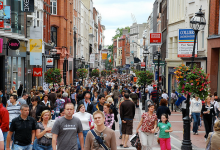Government policy widens gap between rich and poor
"Government policy has been increasing the income of the richest ten per cent of households and widening the gap between these and the rest of society", a study by Social Justice Ireland reports. The report predicts that current Government policy will "produce a dramatic increase in poverty and social exclusion".
(Pictured: Sean Healy of Social Justice Ireland. Download the report by clicking here)









